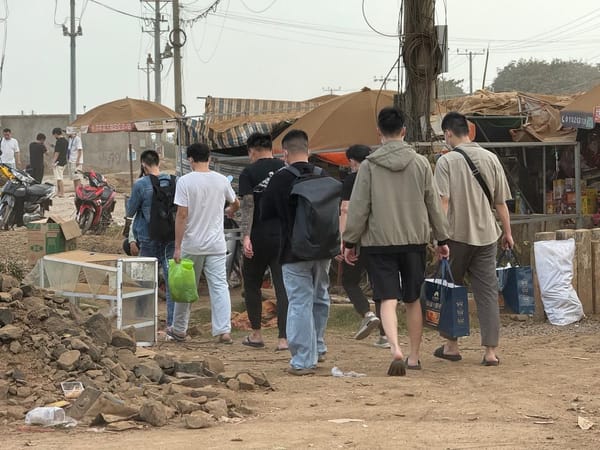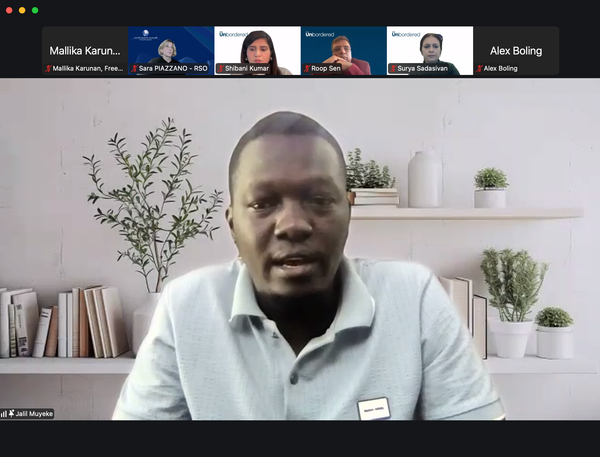Anti-trafficking practitioners convene for a “Brave Conversation” on funding
Freedom Collaborative and GLC host a discussion on challenges and opportunities in the anti-trafficking sector, the ILO commits to global standards for platform work, and this year’s Global Rights Index notes a steep decline in workers’ rights.

The Global Learning Community (GLC) and Freedom Collaborative recently hosted the first in a series of “Brave Conversations”, a space designed to address some of the most complex and frustrating issues in the anti-trafficking sector. In this inaugural session, practitioners discussed the subject of funding and how programming cuts and shifting donor priorities are reshaping the landscape, asking whether the fragility of the global economy and the shuttering of USAID really matter, how much funding is lost to reporting and administration, and whether strategy shifts and greater structural efficiency could result in more impactful work.
Participants shared the ways in which their organizations have been navigating this evolving terrain, for instance by adapting through partnerships and internal restructuring, streamlining their operations, and ultimately moving away from donor-driven agendas and closer to their core mission. Several spoke of using the crisis as an opportunity to reflect and refocus, ensuring that services and strategies align more closely with the actual needs of those they serve.
At the same time, the loss of funding has exposed the fragility of many existing models. In places such as Trinidad and Tobago, the closure of UN offices has created major gaps in support for asylum seekers, shifting the burden onto local NGOs. Without this institutional support, there are fewer care services, legal advisors and safeguards, increasing the risk of exploitation and trafficking.
Others reported more indirect impacts – in Indonesia, for instance, the loss of access to HIV and AIDS medications has undermined health and caregiving support. And for survivor leaders, especially those working independently as consultants or speakers, the cuts have been particularly destabilizing. The progress made in recent years around survivor inclusion is now at risk, as engagement contracts dry up and opportunities disappear.
One organization shared how the loss of a USAID grant led to 11 redundancies among local staff and a reduction in services for survivors, while another highlighted how shifts in government priorities influence corporate engagement – when the public sector signals a lack of interest, the private sector tends to follow suit, reducing both funding and collaboration opportunities.
Despite these challenges, many organizations have pivoted to stay afloat. In some cases, local coalitions and networks have stepped up to share the workload and support survivors, while some groups have streamlined overlapping programs which had previously been duplicated across multiple agencies – there was cautious optimism that this shift might result in better coordination and greater efficiency in the long run. Participants also emphasized the role of cross-sectoral partnerships – with fewer strings attached to specific donor projects, some groups have found new collaborators, including those outside the anti-trafficking space.
One clear takeaway was the resilience of certain funding models. Organizations with unrestricted or trust-based donor support described greater agility and a stronger capacity to respond to crises – donors who already had established relationships with their grantees were more likely to step in with flexible or emergency funds. In contrast, those reliant on tightly prescribed, project-based grants faced more rigid limitations and had fewer options to help them adapt.
Looking ahead, the conversation turned to new approaches to funding. Participants noted growing opportunities for regional donors, development banks, and governments to fill gaps left by others. Others pointed to community-based strategies, including cost-sharing with other organizations, engaging volunteers, and monetizing internal skills. Some shared how local networks and grassroots leaders had helped respond quickly to changing needs, while others described how connecting with private entities had led to unexpected opportunities, such as funding for survivor-led workshops. There was an emerging willingness to engage ethically with corporate actors, not just as funders but as potential partners in changing the systems that perpetuate exploitation.
Finally, the group reflected on what this moment might mean for the movement more broadly. There was a recognition that the crisis offers a chance to distinguish between activity and impact – to ask what’s truly making a difference and what might simply be sustaining a system out of habit. Some noted that while short-term adaptations are necessary, long-term transformation depends on funding models that allow space to tackle systemic root causes.
Here’s a roundup of other noteworthy news and initiatives:
Last week, the International Labour Organization committed to developing binding global standards for platform work, a major milestone in the fight for gig workers’ rights. Backed by a majority of member states and worker delegates, the move aims to tackle widespread misclassification, low and unpredictable pay, and exploitative algorithmic management, though advocates warn the final standards must avoid national loopholes to be truly effective.
The 2025 ITUC Global Rights Index shows that workers’ rights are in a steep global decline, with Europe and the Americas suffering their worst records since the index began in 2014, and just seven of 151 countries achieving the highest rating. The report highlights rampant suppression of unionization, collective bargaining and the right to strike (violated in 87 per cent of countries), restricted access to justice, free speech abuses, and even the killing of trade unionists.
A new report by Hope for Justice highlights that young survivors of modern slavery in the UK face a critical gap in support when they turn 18, and are often left to navigate complex systems without help to access housing, healthcare or education. Informed by lived experience, the report calls for ongoing trauma-informed advocacy, such as the proposed Independent Modern Slavery Advocate (IMSA) model, to ensure stability and protect against retrafficking.
A landmark investigation by Global Rights Compliance traces how state-imposed forced labour in China’s Uyghur Region is embedded in the global supply chains of four key critical minerals – titanium, lithium, beryllium and magnesium – used in sectors from aerospace to consumer goods. By combining legal analysis, production data, and corporate sourcing links, the report exposes how forced labour subsidizes China’s dominance in these markets, raising urgent questions for ESG compliance, clean energy transitions, and trade policy.
Recent findings from the Burmese Rohingya Organisation UK highlight how the Myanmar military is using starvation as a weapon of genocide against the Rohingya, deliberately blocking humanitarian aid in defiance of international court orders and UN resolutions. The organization also draws attention to the Arakan Army’s involvement in systematic abuses and the facilitation of human trafficking, underscoring the international community’s ongoing failure to respond.
Sony has stepped forward to provide financial aid to 283 Bangladeshi workers who had reportedly gone without pay for seven months, according to International Rights Advocates (IRAdvocates). When issues concerning the migrant workers first surfaced, IRAdvocates raised the matter with their former employer, Malaysian firm Kawaguchi Manufacturing Sdn Bhd, and certain manufacturers who were Kawaguchi’s downstream customers, including Sony, they said.
This report looks at the human rights movement in Afghanistan under its highly authoritarian ruling regime, and the ways in which the movement has adapted to survive despite rigorously implemented repression, an almost total lack of freedom of expression and assembly, and strict religious and patriarchal laws that exert enormous control over women’s lives.
The United Nations Trust Fund for Victims of Human Trafficking (UNVTF) is accepting applications for a call for proposals supporting short-term victims’ assistance projects in Africa. The UNVTF encourages applications from survivor-led and/or youth-led organizations, with a deadline for submissions of 31 July 2025, 23:59 CEST.




